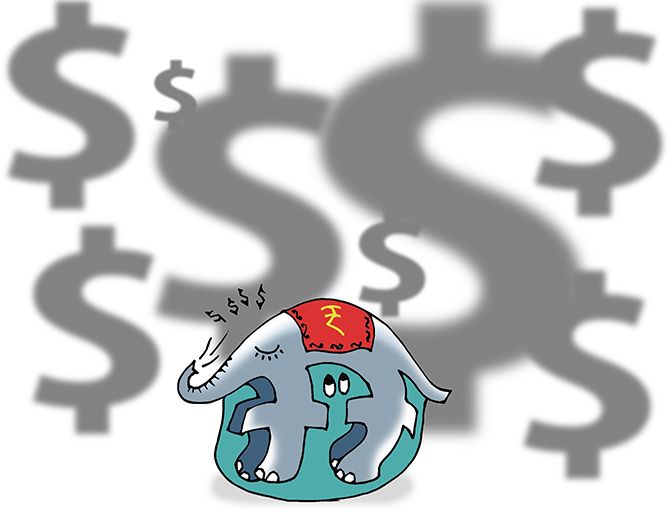 | « Back to article | Print this article |
Despite the 3 per cent gain in September 2019, the FPI sell-off during the quarter has seen the benchmark indices - the S&P BSE Sensex and the Nifty 50 register negative returns in Q3CY19.
Illustration: Dominic Xavier/Rediff.com

Overseas investors have pulled out more than Rs 20,000 crore ($ 3 billion) from Indian equities during the third quarter of the calendar year 2019 (Q3CY19), the steepest quarterly outflow since the October-December 2016 quarter, when they had withdrawn Rs 31,222 crore ($ 4.6 billion) from the equity market.
Foreign portfolio investors (FPIs) have sold equity shares net amounting of Rs 21,592 crore ($ 3.09 billion) between July and September 26, according to the latest available depository data.
However, the volume of outflow slowed after the government announced a reduction in the corporation tax rate.
This contrasts with the first two quarters of CY19, when they had made net inflows of Rs 79,080 crore ($ 11.3 billion) amid expectations of the Narendra Modi-led BJP coming to power for a consecutive second term.
“Post the Budget on July 5, FPI outflows had accelerated given the slowing growth environment and weak corporate earnings.
"Going ahead, Indian equities could see further upside, especially if the Reserve Bank of India (RBI) cuts interest rates in October and takes a dovish stance,” wrote Jitendra Gohil, head of India equity research at Credit Suisse Wealth Management in a co-authored note with Premal Kamdar, their equity research analyst.
Despite the 3 per cent gain in September 2019, the FPI sell-off during the quarter has seen the benchmark indices - the S&P BSE Sensex (down 2 per cent) and the Nifty 50 (down around 3 per cent) - register negative returns in Q3CY19.
While most brokerages remain bullish on the road ahead for Indian equities from a medium- to long-term perspective and have recalibrated their six- and 12-month target levels for the frontline indices, given the cut in the corporation tax rate and the other stimulus measures announced to prop up the economy, they do not see FPIs coming back to India in a hurry.
India Ratings and Research (Ind-Ra), for instance, expects headwinds for FPI flows to India to continue over the near to medium term, despite the accommodative global monetary policy stance and the central government’s efforts to alleviate uncertainty regarding the higher surcharge.
“A gamut of factors, such as slower-than-expected demand growth in major economies, geopolitical and trade tensions and a gradual weakening of the economic growth prospects in India, have contributed to a build-up of risk aversion, which has impeded the demand for emerging market (EM) debt instruments,” they said in a recent report.
U R Bhat, managing director at Dalton Capital, echoes a similar view and cautions that the flows may not pick up dramatically over the next six months.
“There are too many moving parts to the ‘invest in India’ theme.
"Foreign investors first need to be interested in emerging markets (EMs) and only then can they look at India.
"EMs are a risky bet given the host of factors such as trade wars, geopolitics etc.
"That said, domestic institutions have built up enough muscle to prevent a sharp market fall in the absence of foreign flows, which can help indices sustain at higher levels,” he says.
And the data does prove him correct. Domestic mutual funds’ net inflow in equities during the quarter crossed the Rs 40,000-crore mark for the first time since the September 2017 quarter.
They were net buyers of Rs 42,306 crore till September 26, shows the latest available data.